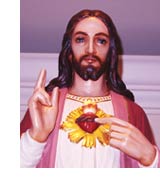Yet, at many tables, loved ones will be missing: spouses, moms and dads, uncles, cousins, friends, and colleagues. So many lost their lives in the tragic events of September 11. We shall feel their absence keenly.
But perhaps "keenly" is not the right word. It's not strong enough. I suspect that many of you may be approaching this first of the holiday celebrations with deep emotions of sorrow, dread, loneliness, and fear. As one grieving person recently told me, "Thanks for calling me, Bishop, but no one, not even the Lord, can heal my broken heart!" Perhaps her heart and the hearts of thousands of others in this county and beyond will never fully mend in the aftermath of that day of terror.
So the question looming before us is this: Can a broken heart give thanks to God? Can a broken heart praise the Lord for His blessings and look toward the future with hope?
In framing a response to this very real question, we should acknowledge how we feel. In the six weeks since September 11, our emotions actually may have intensified. The initial shock that we all experienced may have been replaced with deep-seated anger as grim reality takes hold of our hearts. So many in our midst face the future without loved ones. I think especially of young wives and mothers who lost their husbands. Some of them are facing unexpected economic challenges. Others grapple with explaining the loss they suffered to young children and aging parents. No doubt many are wondering if the love and support they received in the days and weeks immediately following the terrorist attacks will continue - or will they be left alone with enduring grief and long term problems?
And all of us - even as we speak about returning to "normality" - are wrestling with deep feelings of insecurity as one form of terror seemingly gives way to another. On top of all this, some among us may feel guilty for feeling the way they do.
I believe that God does not expect us to feel differently than we do. He is not asking us to ignore our emotions or to mask our sorrow with a superficial veneer of holiday cheer. He is not asking us to embrace a shallow faith that speaks of eternal life but fails to acknowledge the sorrow, fear, and loneliness that always attends death - especially the sudden and unexpected death of someone we dearly love.
We believe with all our hearts in the reality of life everlasting in the enrapturing presence of the Triune God. With Christian hope, we long for eternal life and are consoled merely by the prospect of it. But neither can we ignore how harsh the parting can be. So we say to God with the Psalmist, "A broken, humble heart, O God, you will not spurn" (Psalm 50). Indeed, the thanksgiving of our broken hearts is very precious in the Lord's eyes. After all, ours is not a disinterested God who merely observes human calamities from afar, like a super-astronomer gazing curiously at the universe. Rather, our God is a loving Father who sent His Eternal Son into the world to assume our humanity - including a human body, mind, heart, and will. In so doing, the Eternal Son of God, at the loving command of God the Father, made Himself vulnerable. And as He preached the Good News of Redemption, He prepared for that hour when He would take upon Himself the entire weight of human sinfulness and evil. He who is "God from God and light from light" would undergo death - the one experience that epitomizes human estrangement from the living God. Not only was His Body broken, so, too, was His heart. And from His wounded heart there came forth that victory over sin and death that makes it possible for our wounded hearts to give thanks.
 Sin and evil are real. They are terrible realities. But they are not the last word about human nature and human destiny. Our God did not merely tell us so. He came to experience all that we experience and much more. And in Jesus' resurrection, sin, death, and evil did not prevail. Sin and evil are real. They are terrible realities. But they are not the last word about human nature and human destiny. Our God did not merely tell us so. He came to experience all that we experience and much more. And in Jesus' resurrection, sin, death, and evil did not prevail.
This Thanksgiving, let the wounded heart of Jesus speak to your broken hearts. Unite your hearts to His. Only in that way, can we, in the midst of sorrow and pain, give thanks and praise to God at Thanksgiving and indeed for the rest of our lives.
First published in the November 2001 edition of Fairfield County Catholic, the monthly newspaper of the Diocese of Bridgeport. Reprinted with permission.
back to top
|



